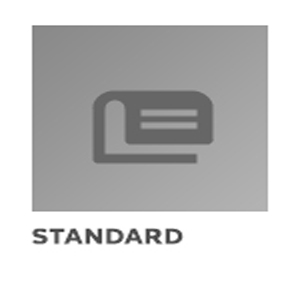Description / Abstract:
Material Description. Plastic Roll Goods (PRG) covered by this
specification consists of two (2) basic construction types;
Supported and Unsupported. PRG materials shall be compounded to be
flexible, free from tackiness and compatible with other PRG
materials, plastics, fabrics and coated genuine leather. Plastic
roll goods must be free from pinholes, pitting or dimpling. The
material must be capable of being routinely handled in the
manufacturing process without damage.
Supported PRG. The material shall consist of a synthetic polymer skin such as Polyvinyl Chloride (PVC), Thermoplastic Olefin (TPO) or Polyurethane (PUR), supported by a textile fabric. The material may also include a laminated foam (flame or adhesive lamination) or foam/scrim back-layer. These materials are typically processed by cut and sew, wrapping and low pressure molding. The supported PRG can be a bilaminate (PRG + foam) or trilaminate (PRG + foam + scrim).
Unsupported PRG. The material shall consist of a synthetic polymer skin such as PVC, TPO or PUR, with no fabric backing, but may include a foam back-layer (bilaminate), or a foam/skin back-layer (trilaminate). These materials are typically processed by methods such as vacuum thermoforming and low pressure molding.
Symbols. The finish symbol code defines the material construction and will be assigned by the responsible department. Trim materials are described by finish symbols which define the commodity, construction, backings, gloss, grain and color. The construction code is a unique identifier of the technology used to make a particular product. The construction code is described in detail on the appropriate completed Supported, Unsupported or Laminate Construction Specification Data Sheets. Note: See Appendix A, Data Sheets A1, A2 and A3 for examples of the Construction Specification Data Sheets. Actual forms can be downloaded fromhttp://www.gmsupplypower.com. The GM SupplyPower folder path is: Document Library, Engineering, Global, Product Design. Folder title: "Textile GMW's – Forms, Templates, and Finish Symbols". Document: " GMW14122 Rev. 2015 Plastic Roll Goods Material Specification Forms".
Applicability. The requirements in this specification are defined based on Type, relative to the application of the PRG on the part.
• Type A: Supported PRG for use on Seats, Door/Console Armrests, and Instrument Panel (IP)/Door Inserts Mid or Lower.
• Type B: Supported PRG for use on IP Uppers and Door Uppers (includes High Heat/Ultraviolet (UV) Resistance).
• Type C: Supported PRG for use on Shift Boots and Steering Column Closeouts.
• Type D: Supported PRG for use on Steering Wheels and Shift Knobs.
• Type E: Unsupported PRG for use on IP, Doors and Rear Shelves.
• Type F: Unsupported PRG for use on Deployable IPs.
• Type G: Unsupported PRG for use on Visors and Headliners.
Note: For requirements for vehicles without solar absorbing glass, contact the appropriate Materials Engineer. All interior materials are developed to be used in vehicles with solar glass; therefore, performance may be compromised if used in non-solar glass vehicles.
Remarks. Not applicable.
Supported PRG. The material shall consist of a synthetic polymer skin such as Polyvinyl Chloride (PVC), Thermoplastic Olefin (TPO) or Polyurethane (PUR), supported by a textile fabric. The material may also include a laminated foam (flame or adhesive lamination) or foam/scrim back-layer. These materials are typically processed by cut and sew, wrapping and low pressure molding. The supported PRG can be a bilaminate (PRG + foam) or trilaminate (PRG + foam + scrim).
Unsupported PRG. The material shall consist of a synthetic polymer skin such as PVC, TPO or PUR, with no fabric backing, but may include a foam back-layer (bilaminate), or a foam/skin back-layer (trilaminate). These materials are typically processed by methods such as vacuum thermoforming and low pressure molding.
Symbols. The finish symbol code defines the material construction and will be assigned by the responsible department. Trim materials are described by finish symbols which define the commodity, construction, backings, gloss, grain and color. The construction code is a unique identifier of the technology used to make a particular product. The construction code is described in detail on the appropriate completed Supported, Unsupported or Laminate Construction Specification Data Sheets. Note: See Appendix A, Data Sheets A1, A2 and A3 for examples of the Construction Specification Data Sheets. Actual forms can be downloaded fromhttp://www.gmsupplypower.com. The GM SupplyPower folder path is: Document Library, Engineering, Global, Product Design. Folder title: "Textile GMW's – Forms, Templates, and Finish Symbols". Document: " GMW14122 Rev. 2015 Plastic Roll Goods Material Specification Forms".
Applicability. The requirements in this specification are defined based on Type, relative to the application of the PRG on the part.
• Type A: Supported PRG for use on Seats, Door/Console Armrests, and Instrument Panel (IP)/Door Inserts Mid or Lower.
• Type B: Supported PRG for use on IP Uppers and Door Uppers (includes High Heat/Ultraviolet (UV) Resistance).
• Type C: Supported PRG for use on Shift Boots and Steering Column Closeouts.
• Type D: Supported PRG for use on Steering Wheels and Shift Knobs.
• Type E: Unsupported PRG for use on IP, Doors and Rear Shelves.
• Type F: Unsupported PRG for use on Deployable IPs.
• Type G: Unsupported PRG for use on Visors and Headliners.
Note: For requirements for vehicles without solar absorbing glass, contact the appropriate Materials Engineer. All interior materials are developed to be used in vehicles with solar glass; therefore, performance may be compromised if used in non-solar glass vehicles.
Remarks. Not applicable.



